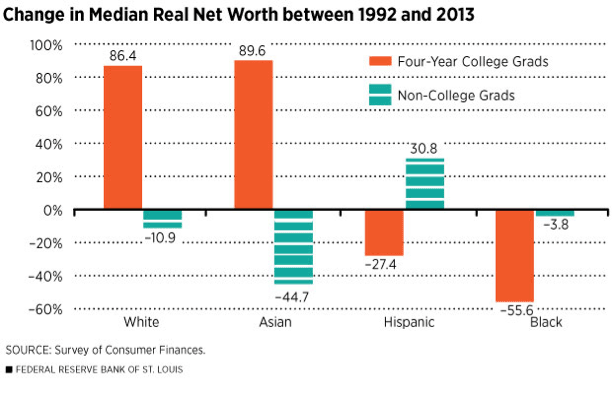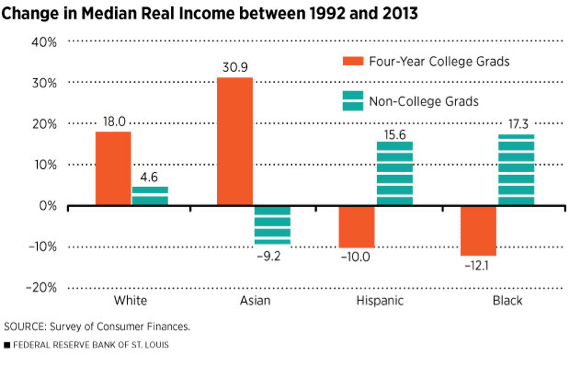Although a college diploma is touted as a key factor to landing a better job and higher income, having a four-year degree wasn’t enough to protect the financial fortunes of black and Hispanic families during the latest economic downturn.
A new study released by the Federal Reserve Bank of St. Louis finds that while a four-year degree does tend to boost income and wealth, the benefits aren’t spread equally across all racial and ethnic groups. “White and Asian college-headed families generally fared much better than their less-educated counterparts,” the study found. “The typical Hispanic and black college-headed family, on the other hand, lost much more wealth than its less-educated counterpart.”
Related: Why Americans Shrug Off Income Inequality
In other words, not only did college-educated black and Hispanic families suffer larger losses of wealth than white or Asian ones, they also fared worse than black and Hispanic families headed by someone without a college diploma.
That troubling disparity in household wealth has also held true over a longer period of time. Between 1992 and 2013, white families headed by college grads increased their wealth by 86.4 percent. College-educated Asian families grew their net worth by 89.6 percent. During the same years, the net worth of college-educated Hispanic families decreased 27.4 percent and decreased 55.6 percent among black families.
“Higher education alone cannot level the playing field,” authors William R. Emmons and Bryan J. Noeth write.

Related: The Best Investment the U.S. Could Make – Affordable Higher Education
While they say that further research is needed to clarify the complex reasons for the stark differences, their report highlights some possible causes. One is that black and Hispanic graduates have taken on far more in debt than their white and Asian counterparts — including student loans and, in particular, mortgages. As they accumulated that debt, the incomes of black and Hispanic grads failed to keep pace with the gains made by other groups, including blacks and Hispanics without degrees. White and Asian college graduates are also more likely than blacks and Hispanics to pursue a graduate or professional degree, which usually equates to higher earnings in the long-term and greater wealth overall.

Those debt-laden black and Hispanic families then got pummeled by the bursting of the housing bubble. The average value of homes they owned fell by around 50 percent, while the average value of white college graduates’ homes fell by only half as much and homes owned by college-educated Asian families gained 6 percent in value.





